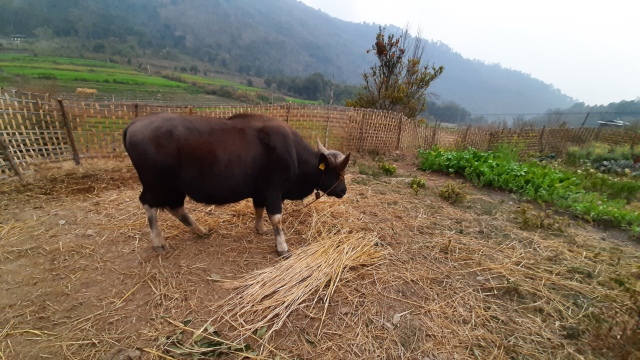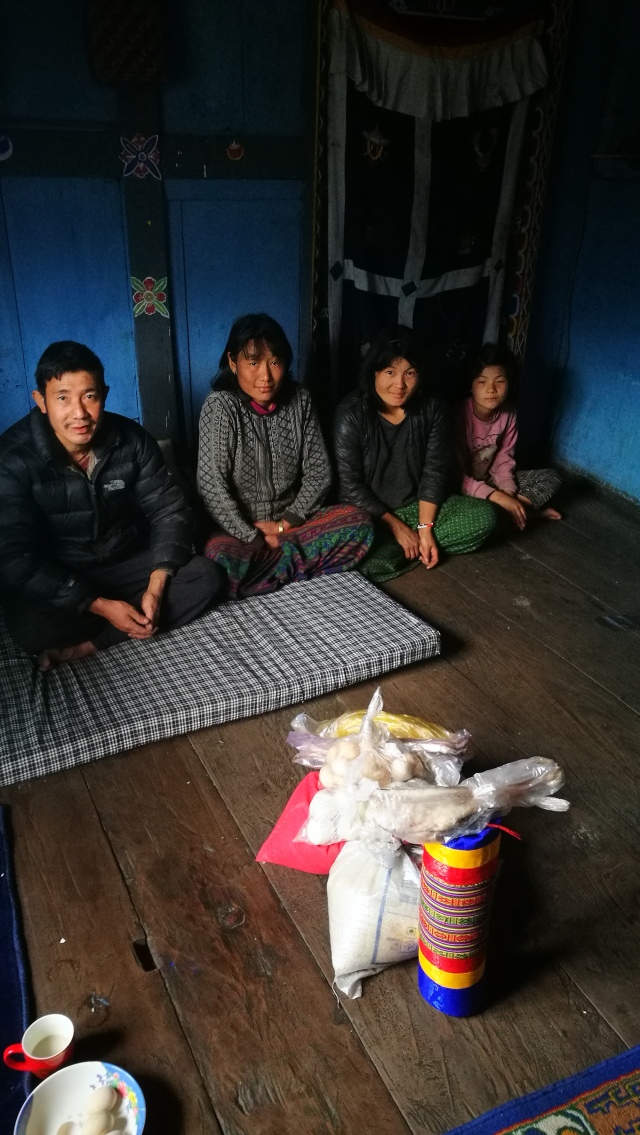Lamga village, Athang, Wangdue – The roosters sound for the second time, one after another, and jostle me up from my sleep. I then hear my host starting the fire in the kitchen. I doze back to my dreams. Another wake up call comes around 6 am, which makes me sleepishly reach for my phone to check the time and see if any WhatsApp messages have pinged in. But there is no Internet service in this valley and so I just put away the Samsung and say my little prayer – and grab a book. After reading for an hour or so, I doze off again.
I am in remote Lawa Lamga in Athang gewog in Wangdue to document the traditional Bhutanese life – for a “participatory observational method” field-work, as we say in the academia – for, Lawa Lamga is probably the last frontier of modernisation in Bhutan. The first school was established in 2010, mobile phone service came in 2015, a Basic Health Unit was built in 2016, a farm road carved in 2017, and finally, electricity in 2018. The first generation of students are completing the high school only next year. Until 2009, not a single child attended school from this village. And except for one young woman who is in Thimphu, the entire population is living in the village, unlike in other parts of rural Bhutan that are half empty.
Lawa Lamga is probably the last frontier of modernisation
This village, therefore, provides the last chance to document the traditional Bhutanese life and society – life before TV, technology, and electricity – and life before the great rural-urban drift. There is one TV, few people with phones and houses with electricity, though. But still, it is a universe that I had known when I was growing up. Life hasn’t really changed much. It will, sooner or later. And this is what has attracted me back to the valley to do some ethnographic research – and to write in peace. Of course, it is not my first time here. I have been associated with the communities here for over 12 years – starting out as a volunteer for Tarayana for few years and then visiting like a part of the community, thereafter.
Lawa Lamga is in Harachu valley in lower Wangdue. It is hidden among the Black Mountains. Once you are are here, you feel you have reached the end of Earth. Beyond, is just wilderness. It is an unexplored territory – but nothing less than any place in the country – both in terms of history or natural beauty. To the north is the famous Tsenden Gang (from where Bhutan got its ancient descriptive name, Lho Tsendenjong – literally meaning The Southern Land of Cypress), and to the east is the Jawo Dungshing (the powerful tsan deity) range bordering with Trongsa. The three surrounding mountains are believed to be Rigsum Goenpo. Lamga, therefore, sits on what they call Saa Droesum Naam Droesum (Where Three Lands and Three Skies Meet) In fact, Chana Dorje, one of the three trinity of deities of Rigsum Goenpo, is their favourite deity. Every third person you meet in, and from, Athang gewog is called Chador. It is also believed that Guru Padmasambhava passed by this place and crossed over to Riti and Nabji Korphu on his first visit to Bumthang in the Eighth century. The Guru Uzha, which is one of the main relics of Gantey Gonpa, was discovered in the area by a cow-herder.
The valley is also mini-Bhutan for, it hosts three ethno-linguistic groups dispersed on either bank of Harachu river. The Oleps – one of the original inhabitants of Bhutan – and who have their own Olekha language, and distinct culture and traditions; the Lawa Lamgaps – who are resettled from Phobjikha and speak Adhakha – a different language altogether; and then finally the people of Samthang, who are a mix of several ethnic groups who speak Dzongkha, the national language, as the native tongue.
Sacred time? – Of family, farm and forest
Life in rural Bhutan is simple – revolving around family, farm and forest. Time is dictated by nature and not by the clock. As American sociologist Robert Levine would put it, it is “event time” out here and not clock time. You often hear someone reminding others, “Sun is almost down. Time to regroup the cattle”. Or “Let’s meet after I have offered water on the altar”. Yes, time here is measured by the position of the Sun or by the daily spiritual routine such as offering and removing water from the altar bowls. It is never based on the watch. And of course, my favourite is, “I will come after I release the cows”, which could anywhere between 6 am and 10 am. Everything is flexible, everything is in slow motion and no one is in a hurry.
People work hard too. Men wake up at the first or second call of the roosters (~4am) and slip out to the jungle to collect firewood, cane or bamboo. Women make their way into the kitchen on the second or third call and start making breakfast and animal feeds. Older grandparents chant sacred mantras and fill the air with their reassuring presense. The researcher (me) is the last to be up. Around 8am. I am forgiven because I am an urban guy. “Town people don’t have to wake up that early,” I am told. I feel less guilty. Gradually, though, I also find myself adjusting to their circadian rhythm.
They have all the time in the world. They have time for everyone.
For the day entire, life seems to roll out with a secret rhythm – saying a prayer, feeding the pigs, tiling the land, weaving baskets, building sheds, repairing a fence, collecting firewood – or simply chatting around a fire and having some tea or bangchang (a local fermented drink). People here seem to have all the time in the world. And they also seem to have time for everyone. Anyone can stray into your house unannounced and no one is turned away. A tea invite is a minimum, ara if you drink, or a meal if you crash during mealtime. No one is offended. Instead, going “empty mouth” is considered inauspicious for the host family. I had more tea in this valley in one week than I have in my entire year elsewhere.
People here live simply and sustainably. They do nothing to exploit the Mother Earth. They only take what they need. And their needs are simple. On the other hand, they are very generous. They give more than what they have. Every day there is someone who drops by with a gift of egg, a bunch of green vegetable, or a stick of tender cane – for me. As an rural-urban transformed, I am simply overwhelmed and feel reconnected to my own roots – the village.
Community before self
Rural Bhutan is about community, sharing and co-existing. Everyone puts on their social self forward and not their individual needs or greeds. Decisions of the community are taken through consensus – not through show of power, position or privileges. Disputes are settled mutually. It is like how a German sociologist, Ferdinand Tonnies, referred to as a Gesellschaft world. Helping each other, and looking out for one another are a norm – and not an exception. My host, for example, is building a house and the whole village gathers every morning to work pro-bono. Some even go beyond. They sponsor all the meals for the day.
Heaven can wait
If time is their biggest asset, time will also be their biggest threat to the traditional and idyllic lifestyle. For, time will bring the inevitable change. In fact, change can already be seen around – in the form of a rice cooker, a power tiller, or a water boiler – or candy wrappers lying around.
Still, to lift from the title of one of my favourite Hollywood movies, Heaven Can (still) Wait.
~~~~~~
References:
– Robert Levine in A Geography of Time
– Ferdinand Tonnies, Gemeinschaft und Gesellschaft (Society and Community), 1887
– Heaven Can Wait (1978) with Warren Beatty











Such beautiful woven basket.should sell them online as laundry basket
LikeLike
I use them for travels. Best basket to be used on horsebacks
LikeLike